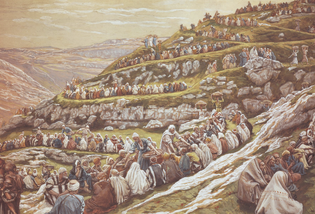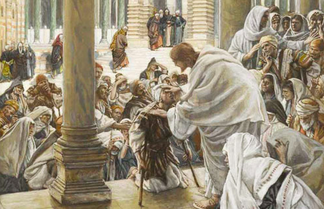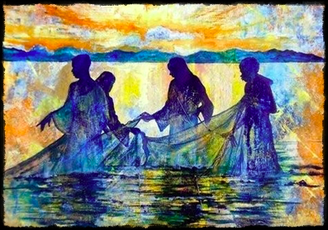 “Whoever does not receive the kingdom of God as one receives a homeless person will never enter it.” Here are some streams of thought that sprung from my sermon prep on Luke 18:15-30 (which is posted fully at the end). For now, this passage is two stories that are most definitely linked together: Infants and children being brought to Jesus for a blessing, being told that the kingdom of God belongs to them, and a rich young ruler who asks how he may obtain eternal life. Additionally, the previous Wasted Blog post is a part of this stream of sermon prep thought: A blunt text, rationalizing, and a confession: a brief reflection on Luke 18:22. There is little doubt that this is about the gospel and the poor: who are we?The wider section of Luke 14-18 that we have been journeying through during the Saturday Sidewalk Sermons and Sunday morning sermons reveals whom we are to seek and welcome to the Table of God‘s Kingdom--that is, whom are to be invited to salvation in Christ, that is eternal life. There is little doubt, the invitation is for the least among us . . . don’t get me wrong, of course, the wealthy and well-off and those who have the privilege and blessings of this age’s systems and structures are invited to come sit with them (it seems this is the Gospel process). In our current passage (Luke 18:15-30), the young rich ruler is instructed to give his wealth to the poor . . . two things to be noted here: 1) for those that didn’t catch this earlier on my facebook feed, this principle was understood by both Jesus and his disciples as a principle to be followed broadly by the rich if they were to be followers of Jesus; and 2) this was what Jesus was modeling--something this young rich ruler could not, in the end, imagine doing, for he walked, sadly, away from Jesus’ gracious invitation to enter the kingdom of God. Perhaps on this Day of giving thanks, we can find a way to give away what we have to the least among us. Most of us will give thanks around a Thanksgiving table for the bounty God has given to us--often accompanied by a comparison to those who have little or nothing (“Lord, we thank you for what we have, for we know that so many are not as fortunate,” et al.) . . . this is more in line with the Pharisee in the preceding parable, who compared himself to others. The parallel in the Luke 6 Beatitude: The kingdom of God belongs to the poorA thought from my sermon text, Luke 18:15-30: the reference to the kingdom of God belonging to the children means these two stories are a poor vs. the rich contrast and we should suspect that deconstruction, a reversal, is afoot: V. 16: But Jesus called them to him, saying, “Let the children come to me, and do not hinder them, for to such belongs the kingdom of God” (ἐστὶν ἡ βασιλεία τοῦ θεοῦ). Note the parallel: Luke has already told us back in chapter 6 that “Blessed are you who are poor, for yours is the kingdom of God” (ἐστὶν ἡ βασιλεία τοῦ θεοῦ. 6:20). And surprise, surprise, the very next thing is a scene of a rich young ruler wanting eternal life (i.e., entering the kingdom of God), who is then told to give to the poor, and walks away from (eternal life!) “because he was wealthy.” Recall how Luke presents the Kingdom Beatitudes back in chapter 6 . . . he parallels the poor/kingdom (6:20) with “But woe to you who are rich, for you have received your consolation” (6:24). I’ll leave it right here . . . Love God, Love Your NeighborLuke 18:16 (just a verse from my whole text, Luke 18:15-30): “But Jesus called them to him, saying, ‘Let the children come to me, and do not hinder them, for to such belongs the kingdom of God.’” When the rich young ruler had heard Jesus say that the kingdom of God belonged to incomplete adults, those not fully human, that is children, this begged a question pertinent to his station and social status (which was good because he was wealthy, which meant he had a name that counts and a status that allowed all the privileges and, of course, he was a grown male which made him fully human). That question was, “Good Teacher, then how do I inherit eternal life*?” He obviously knows how to inherit riches: be born in a legacy family and be a grown male—this is the Rome-way. It is not Jesus’ way . . . this is what concerns that rich young ruler. As it should. As it should also concern us. While Jesus is far more than a mere Teacher as the rich young ruler had addressed him, he picks up on the word “Good” to help the young rich ruler grasp he is asking a first-commandment question—God is the only good, so remember, Love the Lord Your God first—but in the next breath Jesus directs the wealthy ruler to the second--which is like the first (cf. Matthew 22:39)—command, namely to Love Your Neighbor. Thus, give-God-all-you-got is to be met with selling-all-you-got-and-giving-it-to-the-poor, these are the twin sides of inheriting—not earthy riches, that’s easy, just be born with a name and have the right address—of inheriting eternal life. Not sure we’ve actually come to grips with this side of the gospel . . . it’s there, right in our text for Sunday morning (Luke 18:15-30). *The kingdom of God, eternal life, and being saved are all interchanging terms and concepts in Luke. An ellipsis: whoever models Jesus gets to enter into the kingdom of GodI grant the last of this thread is far more application than exegesis (but it’s that, too), yet it is an application that is a faithful reading and dynamic equivalent [you’ll see I do some translating here] to Luke’s and Jesus’ narrative intent (and of the Greek) found in Luke 18:15-30, specifically, verses 16-17: “But Jesus called them to him, saying, ‘Let the children come to me, and do not hinder them, for to such belongs the kingdom of God. Whoever does not receive the kingdom of God like a little child will never enter it’” (ESV). There are a number of things that are before us in the text, for they would have been before both the original audience of disciples and Pharisees, and, as well, those to whom the Gospel was written, namely Theophilus’ church community: 1) As already mentioned, infants and children would have been considered not fully human, incomplete adults, one the lower tiers of human hierarchy, both in the Jewish and the Greco-Roman world; 2) Children/infants simply would not have been presented, especially in public, to any Rabbi (and I note that Jesus is referred to by the rich young ruler as Teacher, aka a rabbi); 3) There would be ritual impurity amid the presentation of the infants that would have been improper for Jewish Rabbis, but obviously Jesus is impervious; and 4) Finally, there is an ellipsis in verse 17 that needs to be understood. Allow for an explanation of the ellipsis before moving on to my application (which reveals the intent of Jesus and Luke here): a grammatical ellipsis, whether written or spoken, is when some words are missing yet assumed, offering some balance to the thought or sentence that is implied by the author and supplied by the hearer/reader. Examples: “John saw two hawks in the sky, and Bill saw three” and “Amanda is managing the restaurant Thursday, and Joseph is Friday.” The second example is like our Luke 18:17 ellipsis, in that the verb “manage” is left out but is clearly intended. The ellipsis in Luke 18:17 is the verb “receive.” The ellipsis is masked by the English word “like” (i.e., “like a child”). The word “like” implies to the English reader that it is the children we should be like. However, the ellipsis being crafted here is to imply that it is the “receiving” that we are to be like. Here’s my translation so you can here and see how the ellipsis works:
The “infants” and “children” are not coming or receiving Jesus in this story. They are not coming to Jesus because of something about them--we infer this, but it is not there in the text and the social/cultural location suggests otherwise. And, it is the parents who are bringing them to Jesus and Jesus is receiving them. Thus, the set up for the intended ellipsis. We should make a narrative link to what Jesus is doing. This is exactly what Jesus is modeling, “receiving children.” He is not receiving children as a child or like a child would--that’s our hallmark-card spin on it--but Jesus is doing the receiving, the welcoming of the children. This reading of the text, and hearing the cultural view of humans that is at play, allows us to apply this warning concerning the unavailability of the kingdom to those who do not welcome/receive children because Jesus has reversed the poles in His kingdom. Now, if we read--as we should--the other aspects before us in this text, namely infants/children would have disturbed the piety of a rabbi (i.e., the clean vs unclean) and the view that receiving them counters the tiered humanity prevalent at that time . . . it would be fair to render this verse: “Whoever does not receive the kingdom of God as one receives a homeless person will never enter it.” Of course, you can change “homeless” to be anyone whom you believe is less than human or unclean . . . and not only believe, but live in such a way that your modeling is nothing like Jesus’ model . . . and the danger? You will not enter the kingdom of heaven. This is affirmed by the next story of the rich young ruler choosing not to model Jesus and turns away from the kingdom. Luke 18:15-30 (ESV)
0 Comments
 While the Pharisees and scribes grumbled that Jesus was receiving tax collectors and the marginal, the uneducated, outcasts living in “the streets and lanes of the city,” and “the poor and crippled and blind and lame” (14:21), eating with them, Jesus asked them a question:
The question sets up an expected answer: “No, no-one would do that!” Such a decision puts the 99 at risk (stop thinking Jesus means for us to assume the shepherd left the 99 well attended—that would spoil the story all together—not sure we are to assume nor fill in the blanks). Simply we have, you see,“Lost sheep happen.” Still, the angle Jesus shoots for is dangerously shocking: this rather well-off Shepherd (having 100 sheep would have indicated he leaned toward being a more wealthy Shepherd) goes and seeks his lost sheep, carries it home, and everyone rejoices. This is the counter to the grumbling of the Pharisees and scribes that Jesus was welcoming and eating with the likes of those strays from Galilee and the marginal he'd been picking up while on his way to Jerusalem. While it is good to see the Shepherd as a picture of Jesus, this leaves the listener/reader with nothing to do but contemplate how much Jesus loves him. A good thing and important, sure, but that’s not Luke’s point. This is a counter to the Pharisees and scribes, which should indicate what we have here is a counter-intuitive correction to the church’s proclivity toward doing exactly what the Pharisees and scribes were doing: neglecting the poor and marginal and socially unacceptable, whether it be to affirm the cultural and socially tiered-hierarchies (both church and outside the church) and/or to not be so unwelcoming of such among them as a church and/or creating and maintaining institutional systems that affirms and sustains the haves/have-nots at church (cf. the problem in James). This is exactly what the previous Banquet parable was about in Luke 14. Additionally, the interlude on discipleship just prior (14:25-33) instructs us that discipleship is following Jesus, and thus we have our marching orders here in this (and the next two) parables of Luke 15.
 The feeding of the 5000 in Mark 6 is a miracle story that reveals who Jesus is—most assuredly. Yet still, Mark’s purpose in writing a gospel for the church community in Rome to be read out loud at the symposium following their supper gatherings (what we might call a church gathering) was to build the church, mature the congregation’s faith, and teach what it means to follow Jesus and acknowledge him as Lord, raised from the dead. More so, Mark’s Gospel, including this feeding of the multitude story, was (and still is) to prepare the church for the persecution, hardship, and the difficulty of being the church while staying faithful to its mission and Lord. The Mark 6 feeding of the five thousand is as much about who the church is as it is about who Jesus is. While the miracle itself is revealing of who Jesus is and certainly links the reader back to the Old Testament Exodus under Moses (thus, picturing a new exodus under One better than Moses, giving the new mana), this is a discipleship story that has a discipleship point to be made to the readers/listeners. First, three times in the space of five verses the word “desolate” (“desert,” actually, “wilderness” is best) is used in a fourteen-verse story—over a third of this vignette on the feeding the 5000 focuses on where this event takes place. And, if we count the reference to “green grass” (v. 39) where Jesus had the crowd sit to be served, this story does indeed focus the reader/listener’s attention on the place of this story; thus, giving a clue to its importance on the subject of discipleship--what does it mean to follow Jesus? Second, the story is mostly about the newly appointed “apostles,” the twelve “sent ones” (6:7-13), who had just returned (v. 30) from the mission Jesus had sent them. The story begins with their return, reporting, and Jesus taking them to some spot—a “desolate place,” a grassy space of wilderness—to eat and rest. “Leisure” (as in “had no leisure even to eat,” v. 31c) is an unfortunate word choice of the ESV, for it gives the impression of fun, earned vacation or a weekend (perhaps), or an extended break from work—here, it simply means a few moments to rest so the disciples can eat. Then, after finding their own “desolate” place to eat, the crowd from nearby towns followed and found “them” (v. 33)—Jesus and the disciples, who had just been going through their towns preaching the kingdom of God. After Jesus spent some time teaching the crowd, the apostles “kindly” mentioned to Jesus that the crowds, who had followed “them” to their desolate place (v. 33), needed to find their own food in some other place (vv. 35-36). While we often focus on Jesus in this story, Mark keeps the “apostles” front and center. Just after the disciples request the crowd be sent away to buy their own food, Jesus instructs them: “You give them something to eat” (v. 37a)--they were their eating (by-the-way) and obviously had food; something from their own resources. Still complaining, the disciples sarcastically say, “Shall we go and buy two hundred denarii worth of bread and give it to them to eat?” (v. 37b). (The disciples really wanted to get this crowd to go away!) Paying no mind, Jesus asks them to gather what they had left from their food—“Five [loaves], and two fish” (v. 38c). Then, Jesus instructs the 5000 to sit in groups of hundreds and fifties (like Moses did) and after blessing this paltry amount of food for such large a crowd, gives the food to the disciples to set before all the people—in other words, to serve the crowd food in that desolate place they had originally found to “get away and eat themselves.” A quick aside: The miracle in this story is very linked to the disciples, for the multiplying of the bread and fish come, not in some surreal miraculous moment, but through the serving of the bread and fish by the disciples—so even here, the story focuses on the disciples. As you can see, while the feeding miracle stands out (and is, of course, important), but the story has the multiplication of the loaves and fish in the serving by the disciples to the people. The content of this story focuses our attention on the disciples—more so, on a discipleship moment. So what’s happening here? Yes, at the very moment the new exodus is revealed, displayed in the feeding of the 5000, and Jesus is revealed as the ultimate Moses, the disciples first find a spot to eat and are interrupted by the crowd who had followed “them” to this desolate place, and, then, wanted to turn them away when it was time for the crowd to eat. There is some irony here for sure. As I had mentioned before in a previous Facebook post: I believe, the readers on this side of the text are to hear that Jesus is setting his disciples up for a lesson—a learned experience, a discipleship moment—in what it means to be a disciple, a follower of Jesus. We, his church, Jesus’ disciples are how the bread and the fish multiply. This is revealed in the focus on the disciples and the desolate place in this story. Later, after the resurrection and as the church increased, this can be seen in the multiplying of tables (in supper rooms) of gathered believers starting in Jerusalem and spreading all the way to Rome and eventually filling and overtaking an empire. We can see this revealed in the multiple references to supplying the needs of the poor in the New Testament. And, that the original (not so much, sadly, later in church history, even up to now) gathering of strangers and unequals (i.e., gathered churches) provided a platform and venue for the poor’s needs to get met, including a meal. The Lord’s supper was a supper after all. We learn of discipleship here: following Jesus is going to interrupt a disciple’s life. Needs are going to be met out of His disciples resources. Meeting needs in inconvenient space, space we thought was for our leisure, is a sign that the Kingdom of God has come. It is proclaiming Jesus—of course use words. But that’s what the disciples did on their short-term mission just prior to this episode. So, the narrative point (Mark’s narrative point) was to move the disciple’s notion of ministry beyond words to illustrating the arrival of the Kingdom in Jesus. Remember, the miracle of multiplying the food was through the serving of the disciples—just at the time they needed rest and needed some leisure time. Ministry and mission, meeting needs and serving—all should be expected to interrupt and invade our leisure space.
 “Again, the devil took him to a very high mountain and showed him all the kingdoms of the world and their glory. And he said to him, ‘All these I will give you, if you will fall down and worship me.’ Then Jesus said to him, ‘Be gone, Satan! For it is written, “‘You shall worship the Lord your God and him only shall you serve’” (Matthew 4:8-10). Recently I was in a conversation regarding Jesus’ temptation in the desert. I have always found it rather remarkable that Satan offered to Jesus what already belonged to Him, namely “all the kingdoms of the world.” The temptation wasn’t to possess the kingdoms—Jesus already possessed them—but in how Jesus would respond to the offer. You and I would have responded, “These are already mine.” Jesus could have responded this way and it would have been all true. Jesus’ response could have been founded on privilege, His status with the Father. But yet, He did not respond in this way. Satan was attempting to get Jesus to act, to respond from His position as God’s Son. We can see this with the first temptation: “If you are really God’s Son, turn these stones into bread.” In the second, the same: “If you are the Son of God, jump—and God will catch you. Prove it.” In each case, however, Jesus did not respond from the privilege of His status as God’s Son. If He would have, that would have been the end of it—the end of it for all of us. No cross. No salvation. You see, Jesus did not give in to the temptation to assert His special status. No. Not at all. Jesus responded with the only thing that mattered (albeit in different ways, but still each time the same): “I will keep God’s word; I remain faithful to God’s covenant.” You and I—as I have heard so often—like to boast in our special status with God. For some reason (pride, most likely) we think we impress the non-Christian world with this stand. This is not the way. While this is true in that a Christian is a son of God, an adopted child of God, the temptation is to prop ourself up in front of others with this position rather than do what is necessary and the only thing that matters: will I keep God’s word and be faithful to His covenant? Sure, you say you are God’s child, you say you are a king (or queen as it may be). I get the royalty you claim. I know the proof-texts. But what we need to know is: will you keep God’s word and be faithful to His covenant? The temptation was not in possessing all the kingdoms of the world, but in humbling Himself—even to the point of death on the cross (e.g., Philippians 2:5-11). This is a real temptation for the Christian: To assert one’s privileged status with God before a watching world. I see this all the time on social media and in conversation among Christians (and in the presence of non-Christians). I even hear this in sermons, instructing Christians to assert their privileged status with God. While most certainly true, this is not the way of discipleship, not the way of following Jesus. All that matters is one thing: God wants to know, the watching world wants to know, even Satan wants to know, will you (will I) keep God’s word and be faithful to His covenant?
 As of January 1, My wife and I live in the Hill, an apartment on Carlisle Street, right next to the Park where we do our summer BBQ ministry. I’m even close enough to walk downtown to meetings and events. One evening, walking back to the apartment from an aldermen’s meeting at town hall, I found myself waiting at a cross-walk when two guys (you can tell, kind of down and out, probably homeless) decided to go, even with traffic coming. One guy had a walker. He walked slow across the intersection, so I headed out with him, telling him, “They’ll have to hit me first.” He smiled and said, “Thanks.” We made it safely, catching up with his friend. They continued to walk slow. I moved on ahead, walking down the block back to my apartment, when I saw a Dunkin Donuts and remembered I had a gift card in my wallet my mom had given me for Christmas. I stopped in to see how much it was for . . . there were no markings . . . $10 the barrister said after scanning it. I went back up the block to my two slow walking friends and said, “Do you guys like coffee?” “Yes,” one of them replied. “I have a gift card for $10—it’s yours.” “Thanks.” They smiled. “Good, we can get a sandwich, too.” I told them: “I can’t take credit for it, my mom gave it to me for a Christmas present.” “Well then, tell your mom, thanks for us.” (I did.) I gave them the card and said, “You’ll see me around. You will see the hat and the ponytail” . . . and, before I could get my name out . . . “Yea, we know. You’re the pastor of the church on Davenport. We know who you are.” How about that? Priceless. Two street, homeless guys, a few blocks from the Hill knew who I was and where our church is. This reminds me that we need to be known . . . and if I get my New Testament correctly, known for the things that indicate the presence of the Kingdom of God. This morning I’d like to bring a messagefrom a thread of passages in the Gospel of Matthew. There is a narrative thread connecting Matthew chapters 4 through 11 that we should listen to, which focuses on Jesus associating with tax collectors and sinners, the poor, the unclean, and the presence of the Kingdom of Heaven. Matthew is asking the readers: How do others know that the Kingdom of Heaven has appeared? To give you the spoiler: Matthew tells us, they can see our association with the poor, marginalized, outcasts, and unclean. This is how they know. I. We are to Follow Jesus around and repeat (what he does): We like to take small bites on the Bible, so sometimes we miss big picture things. And, this is a Big Picture Thing we need to see so we may be better readers of Matthew's Gospel and more faithful followers of Jesus. We begin in Matthew 4:19 where Jesus makes the invitation, “Follow [lit. come after] me and I will make you fishers of men.” The command is to come-after Jesus. That’s the command--follow after me, really follow me around. Most think the command is to be fishers of men—it is not, that’s the promise. We are called to follow Jesus around and he promises to make us fishers of men. By getting the following correct, we become fishers of men. So, what does it mean to follow Jesus around—Matthew tells us. Straight away, just after the call to follow Jesus, Matthew reveals what it was like to follow Jesus around. There is a divine, inspired-ness to what the Gospel writers place into the narrative . . . so right after the scene where Jesus calls us to follow him around, we have . . .
Matthew tells us: we are made fishers of men by following Jesus around—and what did he do?
What we might not realize, however, is Jesus’ first encounter afterHe finishes the Sermon . . . Matthew could have introduced a dozen different encounters, but this is the one He chooses:
This is the Sermon on the Mount realized, illustrated, fulfilled. The Monday after the Sunday Sermon as it were. Now I’m going somewhere with this, so for now remember, following Jesus is actually following Jesus around, learning to do what he did . . . now, we are to repeat . . . *This sermon was preached at Redeemer Presbyterian Church in Concord, MA on Sunday, May 19, 2019. The full sermon maybe downloaded as a PDF (here). An audio version is also be available >> Audio version Part I | Part II | Part III | Part IV
|
AuthorChip M. Anderson, advocate for biblical social action; pastor of an urban church plant in the Hill neighborhood of New Haven, CT; husband, father, author, former Greek & NT professor; and, 19 years involved with social action. Archives
February 2024
Categories
All
|
Pages |
More Pages |
|
 RSS Feed
RSS Feed